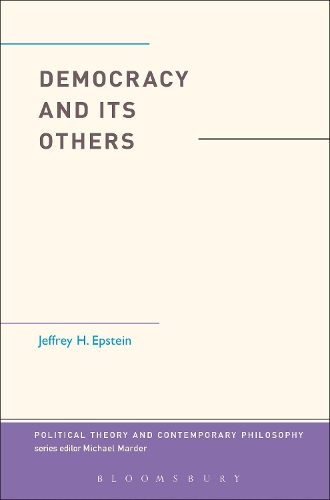
Democracy and Its Others
(Paperback)
Available Formats
Publishing Details
Democracy and Its Others
By (Author) Jeffrey H. Epstein
Bloomsbury Publishing PLC
Bloomsbury Academic
24th August 2017
United Kingdom
Classifications
Tertiary Education
Non Fiction
Political ideologies and movements
Political science and theory
Political structures / systems: democracy
321.8
Physical Properties
Paperback
320
Width 152mm, Height 229mm
431g
Description
Today's unprecedented levels of human migration present urgent challenges to traditional conceptualizations of national identity, nation-state sovereignty, and democratic citizenship. Foreigners are commonly viewed as outsiders whose inclusion within or exclusion from the people of the democratic state rests upon whether they benefit or threaten the unity of the nation. Against this instrumentalization of the foreigner, this book traces the historical development of the concepts of sovereignty and foreignness through the thought of philosophers such as Plato, Locke, Hobbes, Rousseau, Derrida, and Benhabib in order to show that foreignness is a structural feature of sovereignty that cannot be purged or assimilated. Understood in this light, foreignness allows for new forms of democratic political unity to be imagined that reject local practices which deprive individuals of political membership solely on the basis of national citizenship. This cosmopolitan model for citizenship provides a novel conceptual framework that simultaneously upholds the legal importance of democratic citizenship for political justice while ceaselessly contesting the exclusionary logic of the nation-state that reserves democratic rights for members of the nation alone.
Reviews
This book reexamines the legitimacy of the democratic nation-state in a time of unprecedented human migration by exploring the relationship between foreignness and sovereignty in political theory. Drawing heavily on Derrida, Epstein challenges traditional theories of sovereignty as self-identicality, arguing for an alternative understanding of foreignness as an originary, constitutive, and ineliminable structural feature of sovereignty as such. After arguing that both modern liberalism and conservative communitarianism tend to conflate demos with ethnos, Epstein emphasizes Thrasymachuss central role in Platos Republic by meticulously unpacking the complex, contradictory relationships among guests, hosts, foreigners, citizens, friends, and enemies in that dialogue. He then turns to a multichapter examination of sovereignty in the social contract tradition, arguing that, for Hobbes, Locke, and Rousseau, political society is founded on a fear of foreignness that is to be mitigated by the sovereigns efforts to unify its members around a common identity. Sovereignty, however, is always already constituted by foreignness, thereby calling for the (non)concept of the foreign sovereign. Building on Kants cosmopolitan right to hospitality, Derridas autoimmune democracy and unconditional hospitality, and Behabibs discourse ethics, Epstein introduces the foreign citizen, putting the itinerant migrant at the center of any future democratic cosmopolitanism. * CHOICE *
Author Bio
Jeffrey H. Epstein is Visiting Assistant Professor at Cal State University, Fullerton, USA.
